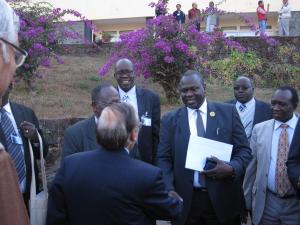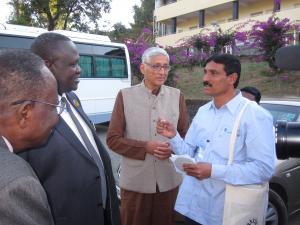Giving the keynote address at the Dialogue on Making Democracy Real, Dr Riek Machar Teny, Vice-President of the newly formed republic of South Sudan, outlined challenges his country now faces to heal the wounds left by decades of war.
National reconciliation was, he said, intertwined with the good governance which the country now needs after its recent independence. Dr Machar Teny said the government has been struggling for national reconciliation for some time and put it at the top of the agenda after the Comprehensive Peace Agreement of 2005 with an attempt to build consensus between all parties.
 He admitted, however, that reconciliation remains very difficult, given the long history of 30 years of conflict in the country. The Sudan People Liberation Movement (SPLM) had gone through ‘different splits’ at different times and this, along with the war with Sudanese forces in the North, had left the country traumatised. The Vice-President spoke emotively about the wounds that this had left. He said 72% of the nation’s population is under thirty years, born during the war, and primarily rural: ‘they know nothing, only violence.’ Even in government and social institutions, ‘a simmering violence’ remains beneath the surface, breaking out in acts of brutality by the army and police.
He admitted, however, that reconciliation remains very difficult, given the long history of 30 years of conflict in the country. The Sudan People Liberation Movement (SPLM) had gone through ‘different splits’ at different times and this, along with the war with Sudanese forces in the North, had left the country traumatised. The Vice-President spoke emotively about the wounds that this had left. He said 72% of the nation’s population is under thirty years, born during the war, and primarily rural: ‘they know nothing, only violence.’ Even in government and social institutions, ‘a simmering violence’ remains beneath the surface, breaking out in acts of brutality by the army and police.
Dr Machar Teny spoke about the numerous plans that have been put in place to overcome these obstacles and restore the nation’s unity. The reconciliation mooted is based on consensus building through a South-South dialogue and the creation of a broad-based government (although the SPLN won 93% of the seats in Parliament in the last election, 20 seats in the government have been deliberately reserved for members of other parties).
A Peace and Reconciliation Commission was founded to work at the grassroots level, but after six years it had had very little success. Rather than leaving it up to one institution, all government ministries were now asked to come up with the building blocks of a plan for reconciliation, to be implemented with UN assistance. Women in particular had been involved throughout the conflict, seeking to create harmony in society, and now worked through civil society and informally in the government.
 There is also a conscious effort to pursue the path of reconciliation with Sudan. South Sudan’s relationship with its northern neighbour is important, since they share long, open borders connected by 15 major roads, the Nile and a railroad as well as trade, oil, the Arabic language, a common history, intermarriage and major communities in one another’s countries, Dr Machar Teny observed. Sudan is also a great opportunity for South Sudan which Dr Machar Teny called a ‘gateway for us to the Arab World and the Middle East’.
There is also a conscious effort to pursue the path of reconciliation with Sudan. South Sudan’s relationship with its northern neighbour is important, since they share long, open borders connected by 15 major roads, the Nile and a railroad as well as trade, oil, the Arabic language, a common history, intermarriage and major communities in one another’s countries, Dr Machar Teny observed. Sudan is also a great opportunity for South Sudan which Dr Machar Teny called a ‘gateway for us to the Arab World and the Middle East’.
The Vice-President said that, on a personal level, bold steps were needed, such as when he himself apologised to those who had been affected by an attack of troops under his command in Bor in 1991. The apology was ‘important so we as one nation can live together’.
Dr Machar's speech was preceded by comments from Dr Omnia Marzouk, President of Initiatives of Change International. Dr Marzouk who comes originally from Egypt and now lives in Liverpool, UK, reflected on the shameful history of slavery in Liverpool and the Arab world which formed a 'wound of history' which still needed healing. 'I am aware that I can’t change history,' she said. 'But for the wounded memories and legacy of this history that those of you from South Sudan, and other countries across Africa still suffer from today – I can only stand here an offer my deepest, sincere apology.'
(You can read Dr Marzouk's speech here >>)
Dr Machar's speech was followed by a presentation by Jeanette Fourie and Letlapa Mphahlele of South Africa, telling their personal and highly powerful story of conciliation. In the struggle against Apartheid, Mphahlele had ordered an attack that had killed Ginn Fourie’s daughter Lyndi. The two had later met where Fourie chose to forgive Mphahlele for the attack, as he had forgiven her for the history of oppression in South Africa. Their story drew tears and admiration from the audience. They were invited to visit South Sudan, where it was hoped their example would spur reconciliation efforts there. Visibly moved by the stories, Mrs Fourie concluded the session, ‘Perhaps you will allow me to articulate my sadness: it stems from the inhumanity of man to man and woman to woman and when I hear the stories from South Sudan, from Egypt and all over the world, my longing for peace is overwhelming.’
In all the second day of the dialogue on Making Democracy Real was an exercise in soul searching and deep contemplation, the participants remarked.
A report of the opening session of Making Democracy Real can be found here >>.


